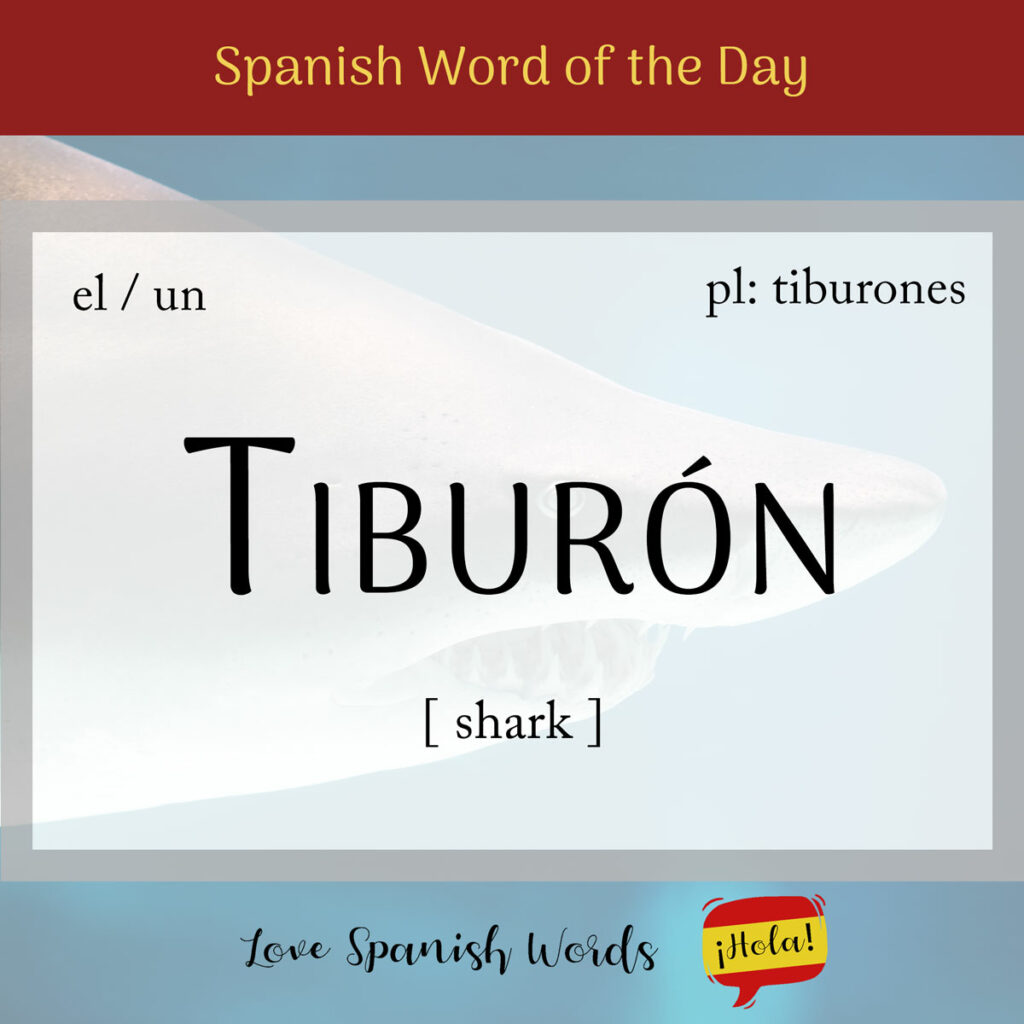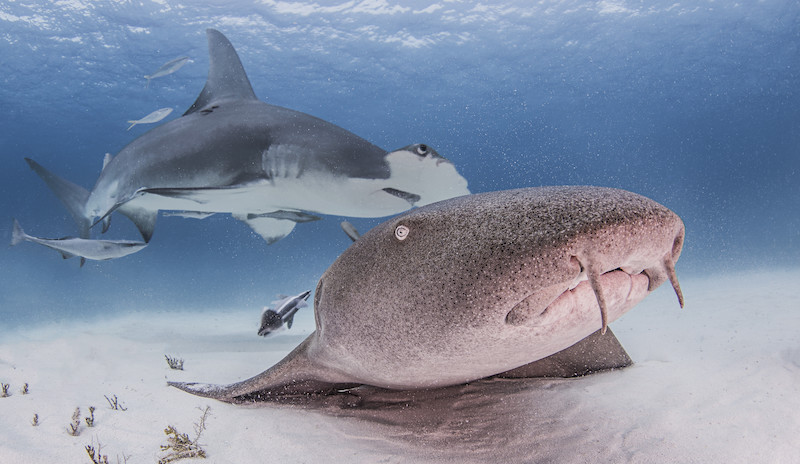One of the most misunderstood marine animals is the shark, known as tiburón in Spanish. These powerful predators are among the most fascinating creatures in the ocean. Despite their fearsome appearance, they rarely pose a threat to humans.
The word tiburón comes from the Latin word tiberīnus, which derives from the Tiber River in Rome, where a specific type of river fish was found. Over time, the term evolved into tiburón in Spanish, becoming the word we now use to describe the marine predator we know today.
Latin American Pronunciation
European Pronunciation

The word tiburón is a masculine noun. Below are the definite and indefinite articles:
- el tiburón = the shark
- los tiburones = the sharks
- un tiburón = a shark
- unos tiburones = some sharks
Cuando fuimos al mar, vimos un tiburón nadando en el agua.
When we went to the sea, we saw a shark swimming in the water.
Tiburones are a type of fish that can be found all over the world. They come in many many shapes and sizes, from the huge whale shark to the tiny dwarf lantern shark.
Here are some are some different kinds of sharks:
- tiburón blanco = great white shark: known for its size, and sharp teeth; one of the greatest sea predators
- tiburón martillo = hammerhead shark: known for its unique hammer-shaped head
- tiburón ballena = whale shark: known for being the largest shark, but it’s a gentle giant that eats plankton and other small creatures
- tiburón toro = bull shark: known for being aggressive and lives in both salt and freshwater
- tiburón tigre = tiger shark: known for its stripes and being one of the greatest sea predators
- tiburón linterna enano = dwarf lantern shark: known as the smallest shark in the world (tinier than a human hand)
Their main body parts are the aletas (fins), dientes (teeth), and branquias (gills). They have various fins, including their aleta dorsal (dorsal fin), aleta pectoral (pectoral fins), aletas pélvicas (pelvic fins), and their aleta de la cola (tail fin).
El tiburón ballena es tan grande como un autobús.
The whale shark is as big as a bus.

Fun Facts:
Tiburones don’t have huesos (bones)! Instead, their skeletons are made of cartílago (cartilage), which is the same material the human nose and ears are made of.
Also, their piel (skin) is covered in tiny, tooth-like scales called dentículos (denticles) that make their skin rough.
As for dientes (teeth), those of the shark are famously sharp. They have multiple rows of teeth and when one falls out, a new one quickly grows back. Tiburones also have branquias (gills) located on the sides of their head to breathe underwater.
Tiburones have varied dietas (diets) depending on the species. Some sharks hunt large animales marinos (marine animals) such as focas (seals) or other sharks, while others eat calamar (squid) and small fish. Then you have the tiburón ballena (whale shark) that eats small fish and tiny plancton (plankton).

Fun Fact:
Tiburones are ancient creatures that have been swimming in the sea for more than 400 million years, way before dinosaurios (dinosaurs) roamed the Earth!
These large fish are great depredadores (predators) because they have a great sentido de olfato (sense of smell) and they can detect sangre (blood) in the water from far away. They also have an excellent sense of hearing which allows them to hear low-frequency sounds at great distances. Furthermore, sharks have electrorecepción (electroreception), which means they can sense electric fields produced by other animals, which they prey on.
Tiburones are an important part of the ecosistema (ecosystem) because they help keep the ambiente marino (marine environment) healthy by preying on fish populations to keep the ecosystem in check. However, some sharks are en peligro de extinción (endangered) due to pollution, habitat loss, and overfishing.
Spanish metaphors and phrases featuring ‘tiburón‘
The word tiburón appears in various idioms and metaphors. Here are some common ones:
Tiburón del marketing means marketing shark in English. It is used to describe someone greatly skilled and aggressive in the marketing field.
Tiburón del fútbol means football shark. It refers to a player who is exceptionally talented and aggressive on the field.
Tiburón de oficina translates to office shark. This phrase is used to describe someone who will do anything in their power to get ahead and gain power. This type of person is strategic in the professional setting and they tend to be fast-moving, competitive, and powerful.
Luis es un tiburón en la cancha de fútbol, rápido y feroz.
Luis is a shark on the soccer field, fast and fierce.

Spanish idioms featuring ‘tiburón‘
Ser un tiburón
Literal translation: to be a shark
English meaning: to be competitive or aggressive in business or other areas of life (ruthless in achieving goals or navigating tough situations)
Nadar con tiburones
Literal translation: to swim with sharks
English meaning: to be in a risky or dangerous situation
Correr como tiburón
Literal translation: to run like a shark
English meaning: to move quickly and decisively, similar to how a shark relentlessly pursues its prey

